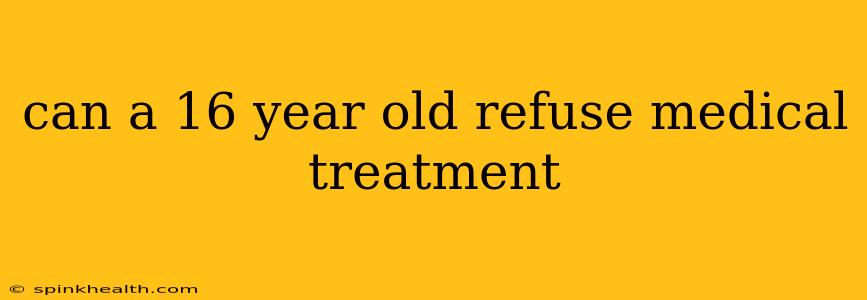Can a 16-Year-Old Refuse Medical Treatment? A Complex Question with No Easy Answers
The question of whether a 16-year-old can refuse medical treatment isn't a simple yes or no. It's a complex legal and ethical issue that varies significantly depending on the location, the type of treatment, and the specific circumstances. Imagine this: 16-year-old Sarah is facing a serious illness, but she's hesitant about a particular procedure. Can she legally say no? Let's unravel this intricate situation.
What is the Legal Age of Consent for Medical Treatment?
The legal age of consent for medical treatment isn't uniform across all jurisdictions. In many places, it's 18, meaning that only individuals 18 or older can legally consent to or refuse medical treatment. However, the story gets much more nuanced for minors. Many jurisdictions recognize that teenagers, especially those approaching adulthood, possess a growing understanding of their own bodies and health. This leads to exceptions and complexities.
Can a Mature Minor Refuse Treatment?
The concept of a "mature minor" is crucial here. This refers to a minor who demonstrates the maturity and understanding necessary to make informed decisions about their healthcare. Courts often consider several factors when assessing maturity, including:
- The minor's level of understanding of the proposed treatment, including risks and benefits. Does the teenager grasp the implications of their decision?
- The minor's ability to communicate their wishes clearly and consistently. Can they articulate their reasons for refusing treatment?
- The minor's overall emotional and psychological maturity. Are they capable of independent decision-making?
If a court deems a 16-year-old to be a mature minor, they may have the legal right to refuse treatment, even if it's life-saving. This is a highly individualized assessment, and the burden of proof often lies with the minor to demonstrate their maturity.
What Types of Treatment Might a 16-Year-Old Refuse?
The type of treatment plays a significant role. A 16-year-old might have more leeway in refusing non-life-threatening treatments, such as elective cosmetic procedures. However, refusing life-saving treatment is a far more complex situation, and courts are far less likely to grant a minor the right to refuse in such cases. The state often steps in to protect the minor's life and well-being.
What Happens if a 16-Year-Old Refuses Necessary Treatment?
If a 16-year-old refuses necessary treatment, the situation becomes legally and ethically fraught. Healthcare providers and parents (or guardians) often face difficult decisions. They may seek court intervention to override the minor's refusal, particularly if the treatment is deemed essential to preserve the minor's life or health. These court proceedings can be lengthy and emotionally taxing for all involved.
What are the Rights of Parents in this Situation?
Parents generally have the right to make medical decisions for their minor children. However, this right is not absolute. As children mature, their autonomy increases, and courts may give greater weight to their wishes, especially in cases involving mature minors. There's a delicate balance between parental authority and a minor's developing autonomy.
How Do Different States Handle This Issue?
Laws regarding minors' rights to refuse treatment vary widely by state. Some states have more clearly defined laws regarding mature minors, while others leave more to judicial interpretation on a case-by-case basis. It's crucial to understand the specific laws in your state or jurisdiction. This is where consulting with a legal professional becomes essential.
In Conclusion: The ability of a 16-year-old to refuse medical treatment is highly situational and depends on many interacting factors. It's crucial to seek legal counsel for clarification in any specific situation. This complex issue highlights the continuous tension between a minor's burgeoning autonomy and the protective role of parents and the state in safeguarding a minor's health and well-being.

